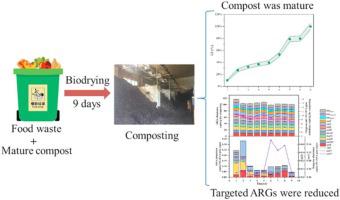Journal of Hazardous Materials ( IF 13.6 ) Pub Date : 2021-11-27 , DOI: 10.1016/j.jhazmat.2021.127915 Xunan Li 1 , Panliang Wang 1 , Siqin Chu 1 , Yulu Xu 1 , Yinglong Su 2 , Dong Wu 2 , Bing Xie 2

|
Food waste (FW) is important object of resource utilization and source of antibiotic resistance genes (ARGs). This study investigated the effects of biodrying combined with inoculating mature compost (B&M) on the composting efficiency, succession of bacterial communities and their links with metabolism functions as well as the fate of ARGs during FW composting. The results showed that B&M could rapidly raise and maintain high relative abundance of Bacillaceae (66.59-94.44%) as well as composting temperature (45.86-65.86℃), so as to achieve the final maturity of FW composting in a short time by regulating microbial carbohydrate (14.02-15.31%) and amino acid metabolism (10.33-12.47%). Network analysis demonstrated that high temperature could effectively inhibit the proliferation and spread of potential bacterial hosts of ARGs and integrons including Lactobacillaceae, Enterobacteriaceae, Leuconostocaceae and Corynebacteriaceae during the first two days of composting. As a result, B&M significantly reduced the absolute (72.09-99.47%) and relative abundances (0.31-2.44 logs) of nearly all ARGs especially ermB, tetM, blaCTX-M and blaOXA. Present study deepened the knowledge of ARGs variation, succession and metabolism functions of bacterial communities when B&M processes were used for FW composting, suggesting a promising technology for reducing the transmission risk of ARGs and reaching maturity of FW composting.
中文翻译:

短期生物干燥可实现堆肥成熟,并在接种成熟堆肥的半连续食物垃圾堆肥过程中显着降低抗生素抗性基因
餐厨垃圾(FW)是资源利用的重要对象,也是抗生素耐药基因(ARGs)的来源。本研究调查了生物干燥结合接种成熟堆肥 (B&M) 对堆肥效率、细菌群落演替及其与代谢功能的联系以及 ARGs 在 FW 堆肥过程中的命运的影响。结果表明,B&M可以快速提高并维持较高的芽孢杆菌科相对丰度(66.59-94.44%)和堆肥温度(45.86-65.86℃),从而通过调节微生物在短时间内达到FW堆肥的最终成熟度。碳水化合物(14.02-15.31%)和氨基酸代谢(10.33-12.47%)。网络分析表明,在堆肥的前两天,高温可以有效抑制 ARGs 和整合子的潜在细菌宿主的增殖和传播,包括乳酸杆菌科、肠杆菌科、明串珠菌科和棒状杆菌科。因此,B&M 显着降低了几乎所有 ARG 的绝对丰度(72.09-99.47%)和相对丰度(0.31-2.44 log),尤其是ermB、tetM、bla CTX-M和bla OXA。本研究加深了对 B&M 工艺用于 FW 堆肥时细菌群落的 ARGs 变异、演替和代谢功能的认识,为降低 ARGs 的传播风险和达到 FW 堆肥成熟提供了一种有前景的技术。


























 京公网安备 11010802027423号
京公网安备 11010802027423号